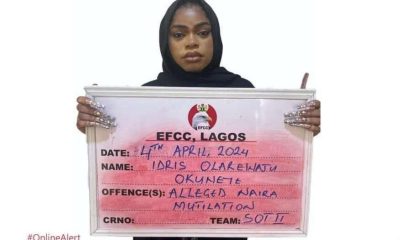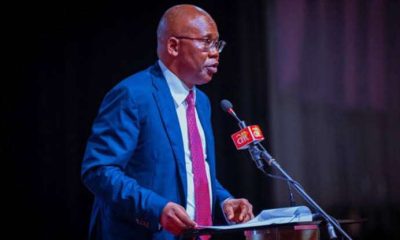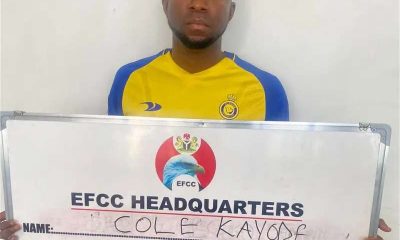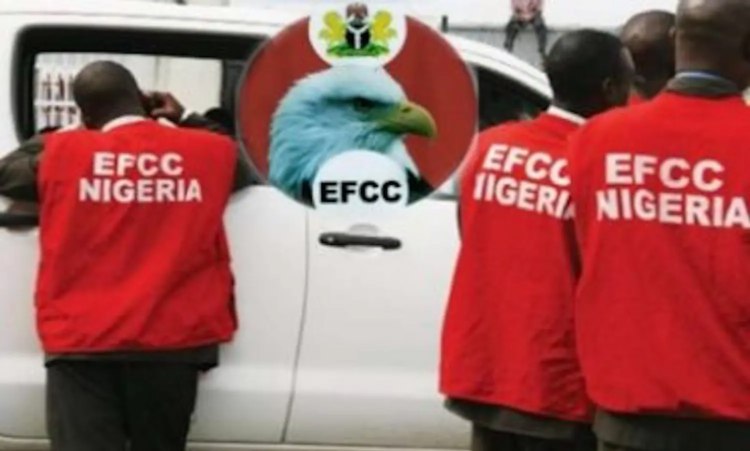Features
Corporate profile: Ibrahim Magu: Burden of anti-graft war
By EMEKA EJERE
Mr Ibrahim Mustapha Magu, acting chairman of the Economic and Financial Crimes Commission (EFCC), must have stirred the hornet nest on recently when he linked the dreaded Coronavirus disease, otherwise known as Covid19, to corruption.
However, that for critics of the anti-corruption war veteran who saw his assertion at the passing out parade of 281 cadets of the EFCC Detective Inspector Course-5, as a demonstration of ignorance. His admirers, nonetheless, see his disdain for graft as the intrinsic message in the declaration.
The EFCC has, in a statement on Sunday titled, ‘Covid 19: Understanding what Magu said’, explained that Magu did not say corruption caused Coronavirus as he only claimed that corruption is worse than cancer and Coronavirus.
But love him or hate him, not many can contest that the Borno State-born police officer has given the anti-graft agency a touch many believe it never had since after the captaincy of Mallam Nuhu Ribadu, as the pioneer chairman.
Magu was one of the early recruits into the anti-graft agency in the dizzying days of Mallam Ribadu. In 2015, Magu before becoming the EFCC boss was a member of the committee set up by the Buhari administration to probe the procurement of arms in the Armed Forces from 2007 to 2015, an exercise that eventually uncovered a cesspool of corruption that shocked the nation. But government buried the report because it implicated the Chief of Army Staff, Lt. Gen. Tukur Burutai, as the army procurement director, and former minister of Interior, Lt. Gen. Dambazzau, then COAS in 2007.
A perceived incorruptible Nigerian, Magu was made the head of the sensitive Economic Governance Unit (EGU), which handled investigations of senior public officials, spear-heading some sensitive investigations including the collapse of Societe Generale Bank of Nigeria. He also played a major role in the investigation and eventual jailing of former Managing Director of the Bank of the North, Shettima Mohammed Bulama, said to be his own brother-in-law.
It was widely believed that after Ribadu was removed as EFCC boss in controversial circumstances by former President Umaru Musa Yar’Adua, Magu was also targeted for redeployment by new EFCC boss, Mrs Farida Waziri, who took over in 2008 and was said to be uncomfortable with his presence on issues of loyalty.
Magu’s troubles crystalized when he was accused of illegally keeping case files of top politicians being investigated by the commission in August 2008. His house in Abuja was searched and his property, including a laptop computer with sensitive files, carted away by officials of the EFCC.
He was redeployed to the police after days of detention with nothing incriminating found against him and later suspended from the force, without salaries for several months. Magu was, however, brought back to EFCC, when his old colleague, Ibrahim Lamorde, was appointed substantive EFCC boss in 2012.
After his victory in the 2015 presidential polls, President Mohammadu Buhari left no one in doubt that he needed a no-nonsense administrator to superintend the fight against corruption which is one of the major planks of his administration. For the President, there was no better choice than Magu.
Upon his appointment as the acting chairman of EFCC on 9 November 2015, Magu immediately swung into action, displaying the zeal to squarely face the challenges inherent in the complicated war against corruption. He employed his expertise as a seasoned investigator; mobilising a crack team of intelligent and resourceful staff, including external hands to wage the war.
Perhaps anticipating the things to come under his watch, his confirmation was a battle for survival and supremacy between the two arms of government and factions within the presidency. His appointment divided the presidency as some people opposed it.
The Attorney General and Minister of Justice, Mallam Abubakar Malami, and then Director of DSS, Lawal Daura, supplied incriminating reports to the senate to reject his confirmation. Twice his confirmation hearing was aborted by such reports, which has left him in an acting capacity for five years, a constitutional aberration of some sort.
Season of exploits
Little wonder Mr Magu has used the instruments of his office to investigate high profile personalities and some dubious companies allegedly doing illicit businesses in Nigeria.
It did not take time for the results of his resolute action to start pouring and some of the then alleged criminals arrested were taken to court where many of them pleaded guilty. Generally, more than 2,500 convictions have so far been secured by the Magu led EFCC as stated by him during his recent visit to the Port Harcourt zonal office of the commission
More prominent among the high profile convictions and incarcerations the agency has recorded under his watch are those of three former governors: Jolly Nyame of Taraba State, Joshua Dariye of Plateau State and recently Orji UzorKalu of Abia State. They are serving various jail terms having been found guilty of embezzling public funds. More former governors are still having their cases in court, while others are under investigation.
The EFCC in December 2019 liaised with the Interpol to secure the extradition of former Attorney General and Minister of Justice, Mohammed Adoke, to face prosecution for over $2 billion Malabo oil deal. Mr Adoke is currently facing trial in the country. A similar effort is also being made by the agency to secure the extradition of the former Minister of Petroleum Resources, Mrs Diezani Allison Madueke, from Britain to face corruption charges.
The commission also recorded amazing achievements in asset recovery between January 2018 and August 2019. During this period, EFCC secured more than 156 convictions and recovered N108 billion
At the 17th edition of the Town Hall Meeting on the Fight Against Corruption, held in Abuja, in November last year, the Attorney General of the Federation and Minister for Justice, Mr. Abubakar Malami, revealed that the federal government had made over N200 billion from final forfeiture cases in 2019.
Malami, who was represented by an adviser to the president on financial crimes, Abiodun Ayodeji, said the federal government had collected in excess of N200 billion “multiple amongst these are the $2.5 million in partial recovery, we also got $75 million connected to the Malabo transactions.”
At the same event, Magu disclosed that his agency had secured no fewer than 890 convictions in economic and financial crime cases in 2019, a feat he described as unsurpassed by any agency anywhere in the world.
Magu noted that the commission recorded 114 convictions in 2015, 189 convictions in 2016,190 convictions in 2017 and 312 convictions in 2018, adding that hundreds of billions of Naira have been also recovered in various categories of asset forfeiture.
“Asset recovery is key in denying the corrupt the enjoyment of the proceeds of his/her crime. It also affords the country the opportunity to channel recovered funds into national development,” he said.
The Magu-led EFCC has also embarked on the massive seizure of ill-gotten properties in Abuja, Lagos and other major cities in Nigeria. On Thursday, August 8, 2019, the commission handed over a 13-bedroom one-storey building and basement seized as proceeds of crime to the management of North East Development Commission, NEDC.
Many have shown indignation as to why President Buhari will continue to retain Magu even after the 8th National Assembly refused to confirm him as the substantive chairman of EFCC. But it appears the reason why the red chamber rejected Magu is the same reason the President thinks there is no better alternative to him.
Reacting to the development at the time, Magu said that his confirmation was rejected by the Senate because he was doing a good job, adding however that his non-confirmation will not stop him from spearheading the fight against corruption.
He said, “I don’t think it (non-confirmation) has given the public a cause for concern. I think it is a lot of encouragement. The fact that I am not confirmed shows I am working. In the anti-corruption environment, if they rush to confirm you, it means you are not doing your work properly. A number of the people we are investigating are also in the National Assembly. I cannot be distracted by those things. Nobody can purchase me; I cannot compromise what I am doing.”
A civil society organisation, Initiative for Leadership and Economic Watch in Nigeria had through its Secretary Abubakar Ibrahim, observed that members of the eighth National Assembly refused to confirm Magu appointment because they had ulterior motives.
The group said, “The refusal by the eighth assembly to confirm the appointment of Ibrahim Magu without any concrete reason is due to the fearless nature with which the acting chairman is tackling corruption in Nigeria. It has sent quiver to the hearts of those who already have their hands soiled in corruption before coming to the National Assembly which has resulted to their outright refusal to confirm Magu as substantive chairman of the EFCC.
“Several of the lawmakers facing financial crime charges in court in which majority of them were former governors who stole from their respective states as governor for eight years are now in the National Assembly fighting Magu’s confirmation because of his firmness and support for President, Muhammadu Buhari’s anti-corruption stance.”.
Magu is also waging a serious war on internet fraudsters popularly called “Yahoo boys”. Many of them have been jailed and their property confiscated. Magu has also set up schemes in Nigerian schools to educate the young one on the dangers of internet fraud trying to do moral rearmament.
But the big irony is that Nigerians are divided over the sincerity of President Buhari’s war against corruption. There are those who believe that it is a war that does not know tribe religion or political affiliation. For such people, Magu is a true anti-corruption warlord.
But there are others who see it as a selective war only targeted at perceived political enemies. For such people, Magu is just a tool to pursue a selfish agenda. What seems to unite everybody, however, is the fact that his reign at the anti-graft agency has never known any dull moment.
Human right lawyer and public affairs commentator, Barr Fred Nzeako, noted that Mr Magu has done fairly well so far and can do better if the executive gives him the freehand to work.
“For a fight against corruption to be quite fruitful, there should not be undue influence by the powers that be”, he cautioned. I also think Magu and his team should be given more support in terms of equipment and personnel to work better.”
On his part, national chairman of United Peoples Party (UPP), Chief Chekwas Okorie, said based on what is in the public domain, Magu has done better than his predecessors in that position.
He stressed that Magu has recorded more convictions than the nation had seen in the past even with no one accusing him of being corrupt himself. Chief Okorie said if the EFCC boss can show the level of zeal he has shown in an acting capacity, he will do it with even more confidence if confirmed.
“I’m not an insider but from what is available to the public, I can say that Magu has done better than his predecessors in that office. He has recorded more convictions than we have seen in the past, and the good thing is that no one has accused him of being corrupt himself.. And if he can show this level of zeal even when he’s not yet confirmed, I think he will do it with more confidence if confirmed.”












